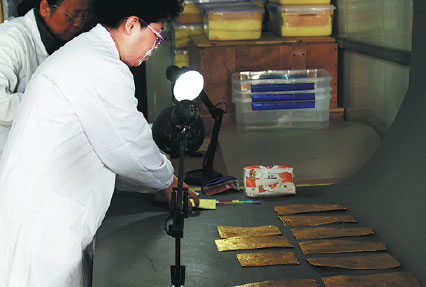Theme park, museum set for tomb site
A theme park and an archaeological museum are expected to break ground in 2016 at the site of the ongoing Marquis Haihun tomb excavation and research center, the top archaeologist of Jiangxi province said on Tuesday.
Xu Changqing, director of the Jiangxi provincial Archaeological Research Institution, said provincial and central government authorities are eager to bring the plan to fruition as part of what he called "open archaeology".
"In my opinion, the essence of archaeology is to explain archaeological findings and cultural relics to the general public in a plain and pristine manner, rather than turning such precious findings and treasures into a catalog of hard-to-digest research essays," Xu said.
|
Archaeologists examine gold plates found at the Marquis Haihun tomb excavation site in Nanchang, Jiangxi province, on Tuesday. Lei Xiaoxun / China Daily |
In contrast to previous archaeological excavations in China, journalists, photographers and documentary makers from Chinese media have been granted permission to immediately report on new discoveries of the final and most exiting phase at the Marquis Haihun site from the Western Han Dynasty (206 BC-AD 24).
Xu said that although some experts might question such an open and timely flow of important archaeological information because it could lead to inaccurate theories and conclusions, he believes the importance of quenching people's thirst for such information outweighs academic needs. "This should be the key focus of archaeologists," he said.
Talk of Haihun Hou, or Marquis Haihun, is basically everywhere, and his name has become a buzzword in the real world as well as in cyberspace.
Jiangxi, rich in cultural and archaeological resources, has been generous to Xu. In 1989, 480 extremely delicate bronze ware items with decorative patterns such as a Taotie (a ferocious, mythical beast) design dating back to the Shang Dynasty (c. 16th century-11th century BC) were excavated from a burial site in Dayangzhou, Jiangxi.
Soon after this excavation, Xu rose to fame in China's archaeology community.
"I stood among the 'amazing' bronze ware and burst into tears", he recalled.
He is even more excited this time because, he said, the Marquis Haihun tomb is "complete in its format, massive in its treasures and high-profile in the royal funerary ranking".
"The surprisingly large amount of gilded bronze ware and lacquer artifacts with gold and silver decoration has broadened our horizons on how sophisticated the Western Han techniques were", said Xu.
"The bronze and iron musical instruments, such as bianzhong (bronze chime), also demonstrated superb craftsmanship of that dynasty," he added.
Xu said he is confident that the excavation of the Marquis Haihun tomb will leave quite an impression on Chinese archaeological history. "This is only the beginning", he said.
Contact the writer at leixiaoxun@chinadaily.com.cn



















